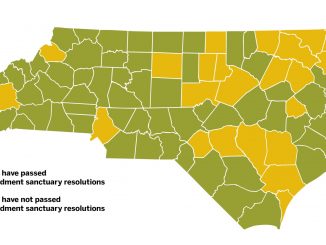
RALEIGH — A majority opinion by the U.S. Fifth Circuit Court of Appeals striking down a Trump-era bump stock ban has been praised by the largest firearms advocacy group in North Carolina.
The ban on bump stocks was enacted by the Bureau of Alcohol, Tobacco, Firearms, and Explosives (ATF) in 2017. The case is known as Cargill v. Garland et al.
The Fifth Circuit reversed that ban on Jan. 6 in a 13-3 ruling.
The Cargill case also centers on the ATF’s reversal of its own definition of “machine gun.” Federal firearm codes define a machine gun as a firearm that can fire more than one bullet with a single trigger pull. The court concluded bump stocks do not cause that type of action when added to a firearm, although they can increase the rate of fire.
“The definition of ‘machine gun’ as set forth in the National Firearms Act and Gun Control Act does not apply to bump stocks. And if there were any doubt as to this conclusion, we conclude that the statutory definition is ambiguous, at the very least. The rule of lenity therefore compels us to construe the statute in Cargill’s favor,” the Fifth Circuit ruling states. “Either way, we must reverse.”
The ruling cited arguments contained in an amicus curiae brief filed on behalf of 19 firearms advocacy groups, including Grass Roots North Carolina (GRNC).
GRNC describes itself as an “all-volunteer 501(c)(4) organization dedicated to preserving individual liberties guaranteed by the U.S. Constitution and Bill of Rights with emphasis on the Second Amendment right to keep and bear arms.” It was founded in 1994.
“Grass Roots North Carolina celebrates the decision of the 5th Circuit Court of Appeals in striking down the ban on so-called “bump stocks” which, despite claims by the ATF, do not meet the statutory definition of machine guns,” GRNC President Paul Valone said in a statement. Firearms equipped with bump stocks still fire one bullet per depression of the trigger, just like hunting rifles owned by millions of lawful citizens.”
Valone also said “GRNC members should be proud that arguments made in the amicus brief we filed in conjunction with other organizations were cited in the Court’s majority decision.” He went on to say that the organization is “especially pleased” that the decision called out the ATF “doing an end-run around the Legislative Branch Under the Constitution.”
One of the other issues raised in Cargill is a constitutional violation. The legislative branch, not the ATF, has the authority to make or change laws.
The ruling by the Fifth Circuit joins previous similar opinions issued by the Sixth and Tenth Circuits as well as the D.C. Circuit Court. The U.S. Supreme Court had previously refused taking up the case, however, that may change given collection of appeals courts blocking the ban.



